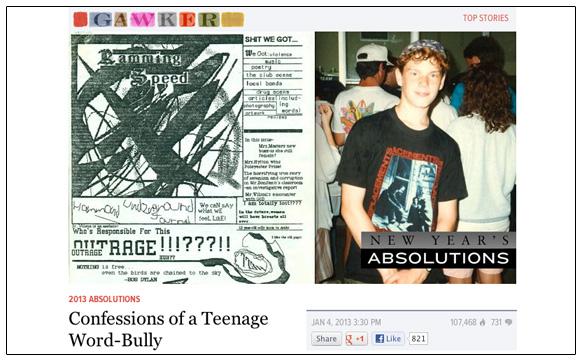In a confessional piece on Gawker last week, John Cook wrote about himself as a craven junior high bully. He was part of a trio of boys who got their hands on an early Mac and used it to produce a scandal sheet with messages like “Jenni Greenwald, please commit suicide,” rumors about a girl named Holly W. losing her virginity, and racist rants against black students and teachers. At the time, Cook and the two boys he was trailing—they were popular and he wasn’t, he says—thought of themselves as rebels anonymously publishing an underground newspaper. They sold 80 copies at school in one day before they got caught.
As an adult looking back in horror at his 13-year-old self, Cook called Jenni and Holly (not their real names) to apologize and to find out what effect the targeting had on them. The answer, it turns out, is varied. Jenni did actually try to kill herself—a surprise to Cook—though not directly because of the cruel messages. But she also remembers the attacks as “almost character-building,” Cook writes. “It kind of opened me up to the idea that I didn’t have to live according to standards,” she told him. Holly, however “described the embarrassment she felt as unbearable. She asked her mother if she could move in with an aunt who lived in another state.” All of these reactions make sense, right? Bullying wounds and scars. Most kids recover. But as I write in my book Sticks and Stones, “The catch, and it’s a crucial one, is that a smaller number of kids involved in bullying won’t recover so well. And we’re not very good yet at knowing who will emerge stronger from taunting and who will be seriously harmed by it.”
Listening to Holly now, Cook writes, “It had never occurred to me as I was giggling over Mac Paint that I might be causing that kind of pain.” Why not? He continues:
Why the need to bully at all? I still don’t know. Teens gang up on each other. They identify enemies. They are terrified of sexuality and fascinated by it. Teen boys brutally enforce rules of sexual conduct that they desperately want girls to violate. Jenni was different. She had a scar. She was operating at the periphery of a powerful clique. And her name was whispered in connection with this sex stuff. Same with Holly. They were acting out sexually (or at least we thought they were), and needed to be punished and celebrated for it.
That all sounds true enough, but also incomplete. The dynamics of bullying are not a complete mystery. At some schools, kids rise in the social ranks for attacking other kids’ reputations. That sounds like what was happening at Cook’s junior high. He was trying to impress the cool kids. He didn’t think about the feelings of the girls he sacrificed to that aim. They were fodder, not people, somehow. He cut himself off from empathy for them. This is the thing about bullying that makes it so hard to stomach: In a particular ill-starred place and time, it turns kids utterly cold and heartless. For an up-to-date example, listen to this amazing story from WNYC’s Radio Rookies about slut shaming. Sixteen-year-old Temitayo Fagbenle interviews a boy who expresses no remorse for ruining a girl’s reputation by posting compromising photos of her online. Because he and Fagbenle are friends, we get the unvarnished version of his unfazed response. What he cares about are the coolness points he scored. He’s still reveling in that.
Cook, as an adult, is at least commendably honest about his own psychology, looking back with horror, as an adult and a parent, on his younger, atrociously behaved self. (Cook is married to DoubleX editor Allison Benedikt. I don’t know him.) The field of bullying prevention is developing, and there are a bunch of promising approaches. Most of them involve shifting a social norm: Figuring out how to make meanness socially costly, as opposed to power-enhancing. That sounds hard in the abstract, but there are schools in which it’s more or less the reality, because people have figured out how to turn aside these supposedly timeless teenage urges.
For his exploits, Cook was suspended for a week. “No one asked us to apologize to Jenni and Holly. And both of them told me that no one from the school ever reached out to them to talk about the attacks,” he writes. This at least we can hope is changing. Though listening to the Radio Rookies story made me feel like we have a ways to go. That boy faced some unspecified criminal proceeding. But he plays that as one more marker of teen badness. He sure doesn’t sound like he apologized, or was forced to think hard about what he did.
